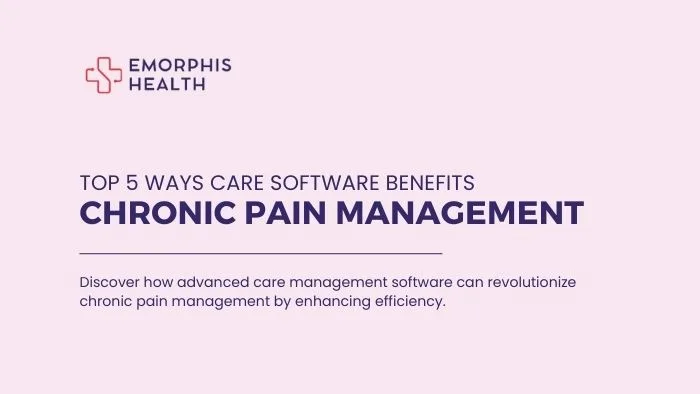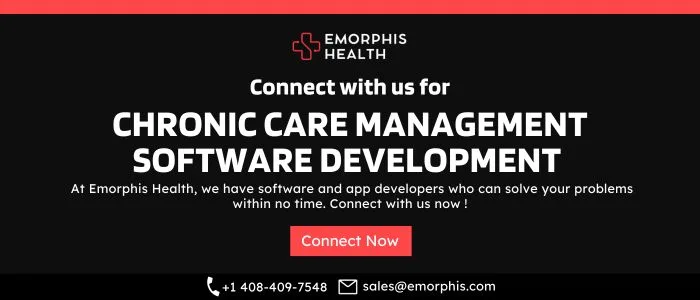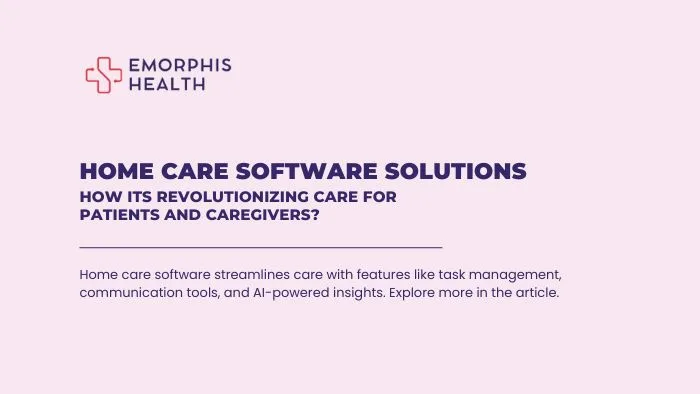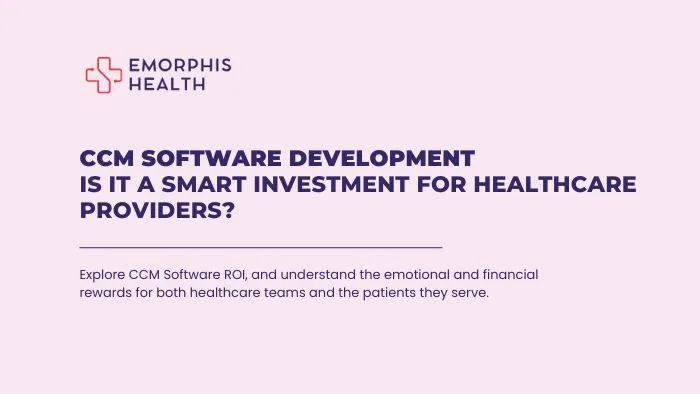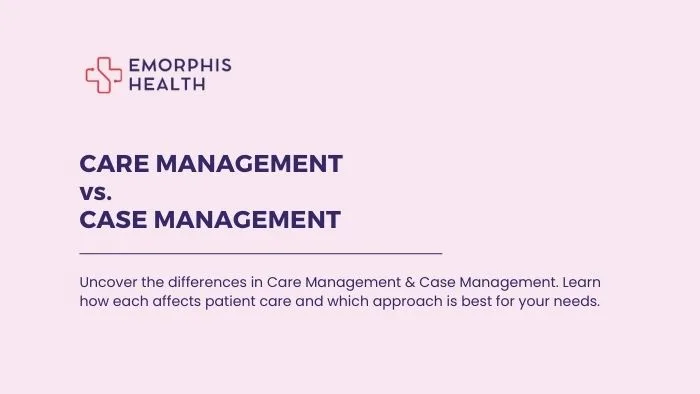Overview
See Contents
Chronic pain is a pervasive and challenging condition that affects millions of individuals worldwide. This ongoing struggle demands a comprehensive and nuanced approach to care that traditional methods often fail to provide. The advent of advanced care management software is revolutionizing how healthcare systems address chronic pain, offering innovative solutions that enhance both patient and provider experiences. This article delves into the pivotal role of care management software in chronic pain management, exploring its use cases, essential features, development costs, and the significant impact it can have on healthcare outcomes.
The Complex Landscape of Chronic Pain Management
Chronic pain, characterized by its persistence beyond the expected healing time, can significantly impair daily functioning and quality of life. Common sources of chronic pain include conditions such as arthritis, fibromyalgia, and neuropathy. The complexity of chronic pain management lies in its multifaceted nature, requiring a coordinated approach that integrates medication, physical therapy, lifestyle modifications, and psychological support.
Traditional methods of managing chronic pain often involve a disjointed approach, with patients receiving care from various specialists who may not always communicate effectively. This fragmentation can lead to suboptimal outcomes and increased patient frustration. To address these challenges, healthcare providers are increasingly turning to advanced care management software as a means to streamline and enhance chronic pain management.
Now question arises, how advanced care management software transform chronic pain Management?
By leveraging sophisticated technology and data analytics, care management software reshapes the patient experience and enhances clinical workflows, creating a more cohesive and effective management strategy.
Let us check it in detail.
1. Creating Personalized Care Plans
One of the most significant benefits of care management software is its ability to facilitate personalized care planning. Chronic pain management is not a one-size-fits-all approach; each patient’s experience and response to treatment can vary widely. Care management software integrates a wide range of data—such as medical history, pain levels, and treatment responses—into a unified platform. This integration allows healthcare providers to develop tailored care plans that are continuously adjusted based on real-time patient data.
For example, if a patient with chronic arthritis reports worsening pain, the software can analyze trends and suggest modifications to their medication or therapy regimen. This level of personalization ensures that care plans remain relevant and effective over time, enhancing the overall management of chronic pain.
2. Enhancing Patient Engagement
Effective chronic pain management requires active participation from patients. Care management software addresses this need by offering tools that empower patients to take an active role in their care. Patient portals and mobile applications provide access to educational resources, self-management tools, and direct communication with healthcare providers. Automated reminders for medication, appointments, and lifestyle activities help patients stay on track with their care plans.
Studies have shown that patients who engage with care management software are more likely to adhere to treatment plans and report higher satisfaction with their care. This increased engagement is crucial for managing chronic pain effectively, as it promotes consistency and adherence to prescribed therapies.
3. Leveraging Data-Driven Insights
Advanced care management software employs sophisticated data analytics to offer valuable insights into patient care. Predictive analytics tools analyze patterns in patient data to forecast potential pain flare-ups and complications. By identifying these trends early, healthcare providers can make proactive adjustments to treatment plans, potentially preventing severe pain episodes and improving patient outcomes.
For instance, if the software detects a pattern of increasing pain levels associated with specific activities or medications, it can alert providers to consider alternative treatments or interventions. This data-driven approach allows for more informed decision-making and can significantly enhance the effectiveness of chronic pain management.
4. Streamlining Care Coordination
Chronic pain management often involves multiple healthcare providers, including primary care physicians, pain specialists, physical therapists, and mental health professionals. Care management software centralizes patient information, facilitating better communication and coordination among these providers. This streamlined approach reduces the risk of fragmented care and ensures that all members of the care team are aligned with the patient’s treatment plan.
Effective care coordination is essential for managing chronic pain, as it helps prevent conflicting advice and ensures that all aspects of the patient’s care are considered in a cohesive manner. By integrating data from various sources, care management software supports a more holistic approach to chronic pain management.
5. Implementing Remote Monitoring and Telehealth
Remote monitoring and telehealth capabilities are integral features of modern care management software. By integrating with wearable devices and mobile apps, the software enables continuous monitoring of patient health metrics, such as pain levels, physical activity, and sleep patterns. This real-time data allows healthcare providers to track patient progress and make timely interventions.
Telehealth features further enhance chronic pain management by providing patients with access to virtual consultations. This accessibility is particularly valuable for individuals who may have difficulty attending in-person appointments due to mobility issues or other challenges related to their chronic pain.
Use Cases of Care Management Software in Chronic Pain Management
For Doctors: Enhancing Clinical Decision-Making
- Personalized Treatment Plans: Chronic pain management is highly individualized. Care management software enables doctors to create and adjust treatment plans tailored to each patient’s unique needs. For instance, the software can analyze data from previous treatments, patient-reported outcomes, and current symptoms to recommend specific interventions. This dynamic adjustment of care plans helps address the variability in patient responses to different treatments, making care more effective.
- Comprehensive Patient Tracking: Doctors can utilize care management software to monitor a patient’s progress over time. The software consolidates data from various sources, such as EHRs, pain diaries, and wearable devices, into a unified view. This comprehensive tracking allows for more informed decisions regarding medication adjustments, therapy modifications, and other aspects of chronic pain management.
- Evidence-Based Insights and Recommendations: Advanced analytics within the software can provide evidence-based recommendations based on large datasets and clinical research. For example, if a patient with fibromyalgia experiences inadequate relief from standard treatments, the software can suggest alternative therapies or adjustments based on similar cases from the database. This evidence-based approach helps doctors make more informed and effective treatment decisions.
For Patients: Empowering Self-Management
- Self-Monitoring Tools: Patients with chronic pain can benefit from self-monitoring tools provided by care management software. These tools allow patients to log their pain levels, track medication usage, and record daily activities. By regularly entering this data, patients gain a better understanding of their pain patterns and triggers. This self-awareness is crucial for managing chronic pain effectively and facilitates more productive discussions with healthcare providers.
- Education and Resources: Chronic pain management often involves lifestyle changes and coping strategies. Care management software provides patients with access to educational resources, including articles, videos, and interactive modules on pain management techniques, exercise routines, and dietary recommendations. This information empowers patients to take proactive steps in managing their condition.
- Automated Reminders and Alerts: Adherence to treatment plans is a significant challenge in chronic pain management. Care management software addresses this by sending automated reminders for medication schedules, therapy sessions, and follow-up appointments. These reminders help patients stay organized and adhere to their treatment plans, reducing the likelihood of missed doses or skipped therapies.
Essential Features and Development Costs
To maximize the effectiveness of chronic pain management, care management software must include several key features:
- Comprehensive EHR Integration: Seamless integration with Electronic Health Records (EHR) systems like Cerner, Epic, and Allscripts ensures that patient data is accessible and up-to-date across all care providers.
- AI-Powered Predictive Analytics: AI-driven insights help forecast pain trends and treatment responses, allowing for proactive adjustments to care plans.
- Patient Engagement Tools: Self-service portals, educational resources, and automated reminders encourage patient involvement and adherence.
- Remote Monitoring and Wearable Integration: Integration with wearable devices provides continuous health monitoring and real-time data for better management.
- Customizable Care Workflows: Workflow automation ensures consistent application of care plans and facilitates coordination among healthcare teams.
The cost of developing such advanced care management software varies based on complexity and feature set. Development costs typically range from $200,000 to $500,000, with custom-built solutions incorporating AI and EHR integration at the higher end of this range. Ongoing maintenance and updates add $5,000 to $20,000 annually.
Impact on Chronic Pain Management
The adoption of advanced care management software has been shown to improve patient outcomes and reduce healthcare costs. According to the Institute of Medicine, chronic pain affects more Americans than diabetes, heart disease, and cancer combined. The global care management solutions market is projected to grow from $12.9 billion in 2023 to $28.3 billion by 2030, reflecting the increasing recognition of its value in managing complex conditions like chronic pain.
Patients using care management software have reported a 30% higher adherence to treatment plans and a 25% reduction in emergency visits related to pain complications. These improvements not only enhance the quality of life for patients but also contribute to more efficient and cost-effective healthcare delivery.
Conclusion
Advanced care management software represents a significant advancement in the field of chronic pain management. By offering personalized care plans, enhancing patient engagement, leveraging data-driven insights, streamlining care coordination, and integrating remote monitoring and telehealth, this technology transforms the way chronic pain is managed. As the healthcare landscape continues to evolve, care management software will play a pivotal role in delivering effective, patient-centered care and improving outcomes for individuals living with chronic pain.
If you’re seeking cutting-edge solutions to elevate your chronic pain management strategies, connecting with Emorphis Health experts could be your next step. Our team specializes in developing advanced care management software designed to streamline patient care, enhance provider efficiency, and deliver personalized treatment plans. With a deep understanding of healthcare IT and a commitment to innovation, Emorphis provides tailored solutions that integrate seamlessly with your existing systems and address the unique challenges of chronic pain management. Reach out to Emorphis today to discover how our expertise can transform your approach to care, improve patient outcomes, and drive the future of healthcare technology.
Sources
- Institute of Medicine (US) Committee on Advancing Pain Research, Care, and Education. (2011). Relieving Pain in America: A Blueprint for Transforming Prevention, Care, Education, and Research. Washington, DC: National Academies Press.
- Market Research Future. (2024). Care Management Solutions Market Growth, Trends, and Forecast 2023-2030.
- CDC. (2020). Chronic Pain and High-Impact Chronic Pain Among U.S. Adults, 2019. https://www.cdc.gov/mmwr/volumes/69/wr/mm6936a2.htm

